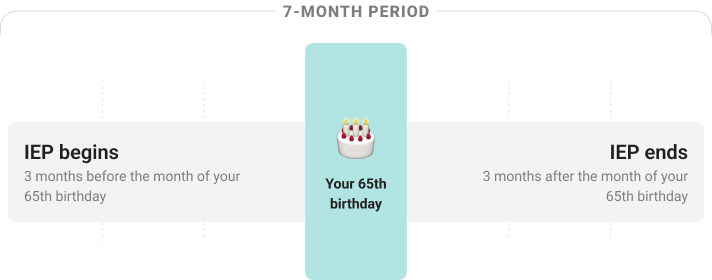New to Medicare? We’ll help you find the right plan
Get all the information that you need to enroll with our Medicare Basics guide.

Learn about Medicare enrollment periods
You first become eligible for Medicare during your Initial Enrollment Period (IEP).
IEP is a 7-month period that typically starts 3 months before the month of your 65th birthday and ends 3 months after you turn 65.

You must enroll in Medicare Parts A, B, and D by the end of your IEP to avoid late enrollment penalties. Learn more about how to avoid late enrollment penalties.
Some people also qualify for Medicare Advantage coverage outside of standard enrollment periods.
Learn about Special Enrollment Periods
Get to know the basics of Medicare
Find answers to a wide range of common Medicare questions in our Medicare 101 video series.
Click the icon in the top right to select a video, or hit the play button to start watching.
Verify your current coverage
Check to see if your doctors and prescription medications are covered. If you have questions, we can help you make a smooth transition and continue to get the care you need.

We’re here to guide you if you need us
Start your Medicare journey today
Ready to enroll? If you’ve verified your eligibility and are within a qualifying enrollment period, you can sign up for one of our Medicare Advantage plans now.
Frequently Asked Questions
If you're going to keep your (or your spouse's) current employer coverage:
- Find out if you need to enroll in Part B to avoid penalties—it may be necessary if your employer has fewer than 20 employees.
- Ask your employer if your plan’s prescription drug coverage is as good as Medicare’s coverage (it’s called “creditable coverage”). If not, enroll in Part D to avoid penalties.
If you're not keeping your employer coverage:
- Talk to your employer to see if there are other options or plans available to people 65 and older.
- Enroll in Parts A and B once you’re eligible.
- Consider Part C (Medicare Advantage) or supplemental plans for additional coverage. Medicare Advantage plans often feature no deductibles on medical services and offer benefits that go above and beyond Part A and Part B coverage.
- Sign up for Part D prescription drug coverage. Many Medicare Advantage plans are offered with Part D drug coverage included.
For all other qualified health plans, you will need to enroll in Medicare Part A and Part B and have prescription drug coverage that’s as good as Medicare’s standard plan (or enroll in Part D) to avoid penalties. A Medicare Advantage plan is a great way to get all the parts of Medicare in one plan. If you choose to keep your current coverage once you turn 65, you will lose any premium tax credits or other savings you are currently receiving. Since you will still need to enroll in Medicare Part A and B, a Medicare Advantage plan may be a better alternative.
If you have an Essential Plan, your plan will end at age 65 and you will need to enroll in Medicare for health coverage.
You can only enroll in Medicare Advantage during specific times of year. Most people become eligible for Medicare Advantage during the Initial Enrollment Period (IEP), which typically begins 3 months before the month of your 65th birthday and ends 3 months after. You can learn more about Medicare enrollment periods on our eligibility page.
Medicare is also available for some people with disabilities under 65. To qualify for this coverage, individuals need to meet specific criteria with the Social Security Administration which can be verified on their website.
You can search for in-network medical, dental, hearing, and vision providers on our find a doctor page.
